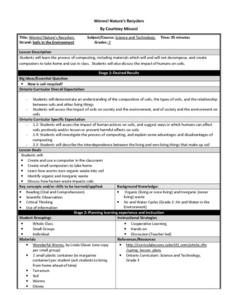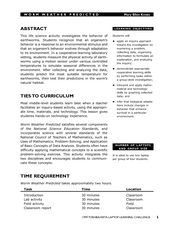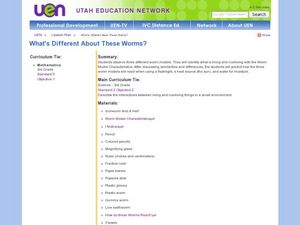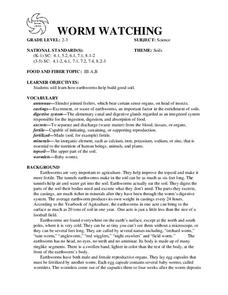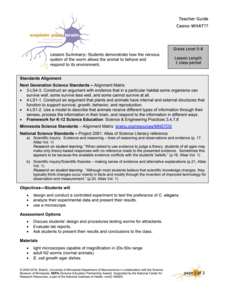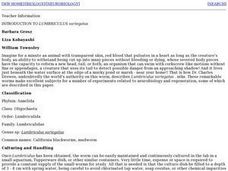Curated OER
Investigating the Response of Worms to Soil Improvers
The worms crawl in, the worms crawl out, but do they care what soil is all about? Find out in an easy and fun controlled experiment. Have your young biologists hypothesize, test, and draw conclusions about which type of soil worms...
Curated OER
Worms, Nature's Recyclers!
Students study what worms need to survive in different environments. They study how worm composting improves soil and reduce waste. They discuss composting techniques and present a puppet show about a worm's life.
Curated OER
Worm Weather Predicted
Students examine worm habitats. In this animal habitats instructional activity, students participate in a lab activity that requires them to explore the adaptations that earthworms make to their environment.
Curated OER
Worm Interviews
Students identify types of worms. In this organisms lesson plan, students are shown slides of the different types of worms and take notes on each worm. Students answer questions about each worm.
Curated OER
The Three Worm Phyla
Ninth graders examine the three worm phyla. In this classification lesson, 9th graders observe, compare and contrast the planarian, tapeworm, and fluke.
Curated OER
Causal Patterns in Ecosystems Section 3
Students design and create a worm and worm free compost tanks for observation of decay in ecosystems. They make predictions, care, and revist tanks using their journals for observation and data collection.
Curated OER
A Worm World
Students maintain a compost bin and build a worm observatory. They design experiments relating to worms and record observations in a worm journal.
George Watts Montessori
Upper Elementary Lessons for Classroom and Garden
Plant knowledge by doing to create long-lasting results. Creating a school garden gives young scholars the opportunity to study several science topics. By working through the unit of 16 lessons, pupils use their gardens to complete...
Curated OER
Getting to Know You: Meal Worms
Students recognize differences between themselves and other people, and accept their uniqueness as a positive gift, by studying meal worms.
Curated OER
Three Worm Lesson
Third graders observe properties of three worms. In this living and non-living lesson, 3rd graders study characteristics of living and non-living worms. Students experiment to find how light, heat and moisture effects each of the worms....
Curated OER
The Dirt on Worms!
Fourth graders make predictions, observe, collect and record data. They investigate several soil and worm websites. Finally, 4th graders write a letter to The President which defends earthworms by explaining their value to the United...
Curated OER
WORM WATCHING
Students investigate how earthworms help build good soil. They examine the worms carefully to find the ringlike segments and swollen band at the front of the earthworm's body. Students take turns dampening the soil every day and adding...
Curated OER
Vermicomposting
First graders investigate composting. In this biology lesson, 1st graders identify ways to use garbage as fertilizer. Students examine soil and compost matter as well as the role of worms in the dirt.
Curated OER
What type of soil do worms like?- An Investigation
Students study four types of soil and predict which one worms would use for their habitat. They observe worms in each type of soil and monitor their activity. They create class charts highlighting their discoveries.
NOAA
What's New?
Biodiversity in some areas is more diverse than one might think. Using a two-day lesson, pupils consider the biodiversity of the Hudson Canyon and the characteristics of one organism. They begin with an analysis of the common earthworm...
University of Minnesota
Caeno-WHAT??
Can you feel that? Can you smell that? Since pupils can't ask worms about their sense of smell and touch, they design and complete an experiment to answer these questions. Individuals expose nematodes to different stimuli using their...
Curated OER
Working Worms
Fourth graders examine earthworms. In this earthworm lesson, 4th graders investigate how earthworms help prepare soil for planting. Students examine other living and nonliving elements in a garden habitat.
Baylor College
Animals' Needs
Explore the wonderful world of earthworms as your class learns about the requirements of animal life. After building soda bottle terrariums, students observe worms over the course of a couple weeks, building an understanding that all...
Curated OER
Warming Up to Worms
Learners observe a worm and answer a set of related questions pertaining to the worm's features: feel, shape, "facial" features, movement and length.
Curated OER
Science: Where the Worms Live
Students build mine-earthworm habitats to discover their niche in them. They make predictions about what the niche looks like in a week and draw a picture of it. Students notice the tunnels in the soil and how the sand and dirt are now...
Curated OER
Introduction to Worm Bin Project
Learners observe the decomposing process of the food chain in a worm bin. They observe whether the type of food fed to worms affect the castings given off during the decomposition process. They learn and practice graphing their findings.
Curated OER
Growing Plants with Worm Castings
Students test worm castings for content and use them to grow seeds. They hypothesize which castings best sustain seed growth. They observe growing plants to test their hypotheses. Later they graph their data.
Curated OER
Worm Bin Project Data Exchange
Students work collaboratively to exchange data with their peers (groups of students at other schools) about their worm bin project. They discuss differing findings and hypothesize reasons for these differences.
Curated OER
Introduction to Lumbriculus variegatus
Students conduct two set experiments on Lumbriculus worms and create a third experiment of their own. The first of the two set experiments allows students to observe regeneration of the worms while the second allows students to test the...
Other popular searches
- Diary of a Worm
- Worm Rhyme
- Meal Worms
- Gummy Worms
- Earth Worms
- Inch Worms
- Worm Composting
- Segmented Worms
- Measurement Grade 3 Worms
- How to Eat Fried Worms
- Wonderful Worms
- Tube Worms



